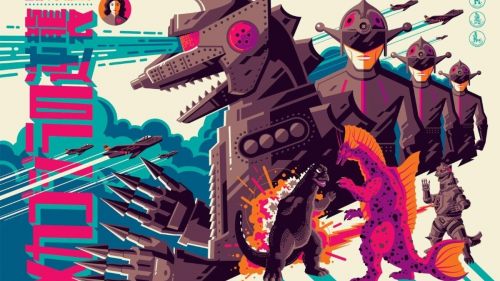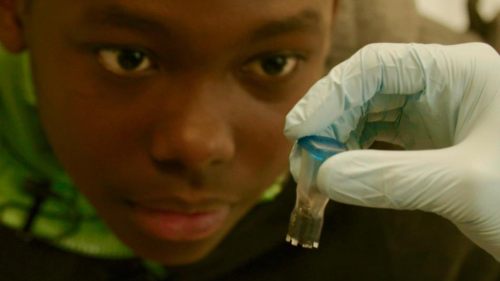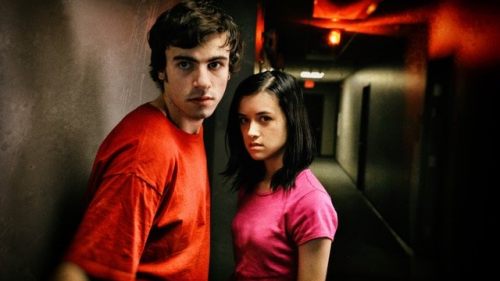SXSW Interview: Jeremy Dyson And Andy Nyman Talk GHOST STORIES And Their Love of Horror
Ghost Stories premiered this week at SXSW in Austin, Texas. The anthology film centers on paranormal skeptic Professor Phillip Goodman (Nyman) who is tasked with the quest of debunking three cases of inexplicable hauntings passed over to him by one of his idols, Charles Cameron (Leonard Byrne). Each case tells a unique tale of potential encounters with the afterlife while the ending of the film blurs the line between life and death, present and past, as well as reality and the subconscious. It’s a creepy film that ultimately closes with a hard-hitting realization. You can read Jacob Knight’s full review here. I spoke with directors Jeremy Dyson and Andy Nyman earlier this week. They were an absolute pleasure to visit with, and I would have loved to nerd out with them longer.
You both wrote Ghost Stories, but initially as a play that premiered at Liverpool Playhouse. Can you talk about that transition, and why you chose to do a film adaptation as opposed to a TV show?
Andy Nyman: Well, I think the simple answer is that we really love films. The thing that bonded us when we met when we were fifteen was horror films. We’re still as obsessed with it as we were then. That’s been carried with us all of our lives. So, it’s sort of two-fold: first, that’s the form we love most, but then there’s that sort of fanboy side of you that thinks "my God, if you get it right, you’re going to be in those books. Imagine if there’s a photo of us or our film in that horror book or that horror book or that or that.” It’s sort of feeding back into the thing that’s made us who we are. Somehow TV doesn’t have that same connection.
Jeremy Dyson: Yes, absolutely. Although it started life on stage, that theater show was about our love of cinematic horror. One of the greatest challenges that we embraced and enjoyed putting on stage was the idea of taking horror film imagery, tropes, and ideas and putting them in a theatrical space. When it came to putting it on film, another part of the journey was how do we take that stuff and do it in a way without making it feel cliche and instead making it feel fresh, exciting, and interesting. As Andy said, that’s coming from a place of love and everything we loved about horror since we were kids.
Andy Nyman: There’s also something about thinking about the horror films that we love. The ones that have really, really stayed with us are films that have something to say - which horror has always been extraordinary at. People who don’t like horror, one of the things they sort of misunderstand is they think it’s just weird people who do gross stuff; when actually it consistently pushed boundaries and brought things to the floor to be talked about that are uncomfortable. We like that. Somehow, there’s something condensed about the experience of film that TV doesn’t do the same way. Also, the experience of seeing a film in a cinema is different than watching TV at home.
Yeah, that collective viewing experience can be really special and more fun. It’s cool to have a background in both theater and film as to almost experiment within the genre, especially since horror isn’t regularly recognized on stage.
Jeremy Dyson: I think what the play and the film have in common is that they’re both about an audience. We’re always asking ourselves what will this do to the audience, how will the audience feel, and thinking about the audience not as one person, but a group of people.
You also wrote a book about horror called Bright Darkness: The Lost Art of the Supernatural Horror Film. Did you translate elements from your book into the film?
Jeremy Dyson: Yeah, it’s interesting because I haven’t picked it up since I wrote it, really. There are lots of things that are silly about it since I wrote it at a young age, but there’s a lot of passion as well. I looked again recently because it’s out of print and someone approached me about releasing it again, and I saw all the arrogance you have in your twenties. There’s no way I wanted to put that out there again. But I did enjoy seeing the passion in it and it sort of became the pit of what we’ve gone on to do. It was written in the mid-nineties, and we’re now in a golden age which has been going on for about fifteen years, really since the turn of the century. I date it from The Sixth Sense onwards. There’s just been tremendous stuff and that wasn’t the case when I was writing Bright Darkness.
I agree. The craft has definitely elevated over the past few years.
Jeremy Dyson: I think some of that has to do with technology. It’s easier to make movies now and to make them in low light. Digital cameras you can shoot with no light at all, and that makes a big difference for this kind of film.
The lighting in the film actually stuck out to me. There were scenes reminiscent of Argento’s Inferno at times.
Andy Nyman: Oh cool, because we’re big Argento fans!
Jeremy Dyson: Huuuuge!
Andy Nyman: They’re so stylized. If you could ever create anything that has something as bold - that’s the thing that’s so exciting about the early Argento and Bava stuff like Blood and Black Lace. You just look at the courage of those color schemes…
Jeremy Dyson: Well, it’s kind of a “fuck you” as well.
Andy Nyman: Yeah, that’s the joy, like we are going to do it this way. It’s a very Italian thing. They’re so confident. When we talk about this stuff and God knows we like to talk about this stuff - the thing that we love is when you make a list of the films that properly affected you and have really had an impact on your life and that list, without question, that we put together, are personality-driven films. I know something about Argento, about Tarantino, or Ti West. I know something about the Coen brothers because so much product is vanilla or doesn’t touch you or have an impact. On one hand, it’s an obvious thing you have to do but also a very difficult thing to do because it requires courage but it also requires asking big questions of yourself. For example, we want it full of personality but what does that mean? Who are we? What do we want to say? The craft is difficult anyway but making something that is you is harder because you need to know who you are and what you want to say.
Jeremy Dyson: And it’s exposing as well. You’ve got to put up with it not working or not connecting with the audience and all the discomfort that goes along with that.
In terms of connection, I enjoyed the fact that Ghost Stories as a title itself implies a supernatural element, but also hits you on a relatable level and cements itself in reality. That misdirection was great and ended up scaring the shit out of me at the end. Can you talk about how you translate supernatural elements through realistic human fears?
Andy Nyman: There’s no question that there’s a debate on whether paranormal stuff is real. We have strong ideas about it. The thing that’s inarguable is that human beings are capable of the most terrible, wretched things. You just have to turn the news on for one day to have that proven. Whether that is slaughter, corruption, wielding power over the powerless, or gloating and the lack of humanity. You see it on a daily basis. So, that stuff is inarguable. Whether ghosts exist, everyone’s got an opinion on that and there’s no either way. That was really big for us.
Jeremy Dyson: We always thought about the supernatural stories we loved, not just in film but in literature as well. It’s always, in some way, a very moral form. The best stories that stay with you are always about sin, guilt, or things people wish they hadn’t done or hadn’t had happen to them. We knew that when we started the play, that we would have to dig into our own regrets and things that happened to us. It was very personal.
Andy Nyman: What’s interesting is how even in the darkest moments in your life, things are also funny. They cohabit. It’s shining a light a little bit on that as well. None of it is black and white, it’s just a journey. Some of that journey is okay and some of that journey is not okay but that’s what it is.
The film is almost similar to a Dante’s Inferno-like journey in the sense of going through various stages, or realms even, to find out the truth while there was a guide you may or may not have known was present. The settings were all very different as well with the woods, the home, the work setting. What was the intention behind each setting of the stories?
Andy Nyman: Yeah, they were all places that are supposed to feel familiar in some respect to the genre. It’s also fundamental, you’re dealing with a man on his own in each of those instances. So, from a nuts and bolts point of view when we were first creating the play, it’s about how they should all feel different and the simple solution to that is they’re all in different places. So, it was initially a pragmatic thing. It was also a love for the different tropes we adore about horror - the walking around a big empty house, being lost in the woods. One of the challenges was bright light, one in absolute darkness. That was a big challenge but also really exciting visually.
You mentioned there was a lot of truth in the film. Do either of you have your own ghost story that influenced any of the tales?
Andy Nyman: No. (both laugh) Well, not in terms of supernatural things.
Jeremy Dyson: Yeah, there’s a lot of truth in the film from our own lives like things we did as a kid or things that you do in life that you regret. For example, pretending to pass the driving test. That was me, I didn’t have the experience that followed, but I told that lie and it had an unbelievable impact on my life. So, the idea of telling one big lie and it having unbelievably negative consequences. That’s an example of that.
Sure, and that’s a haunting in and of itself.
Jeremy Dyson: Exactly, yeah.
Andy Nyman: Absolutely.



